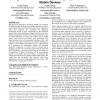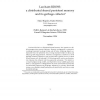57 search results - page 2 / 12 » Data caching, garbage collection, and the Java memory model |
ASPLOS
2004
ACM
13 years 10 months ago
2004
ACM
Tracing garbage collectors traverse references from live program variables, transitively tracing out the closure of live objects. Memory accesses incurred during tracing are essen...
MOBICOM
2004
ACM
13 years 10 months ago
2004
ACM
The progress of mobile device technology unfolds a new spectrum of applications that challenges conventional infrastructure models. Most of these devices are perceived by their us...
LCTRTS
1999
Springer
13 years 9 months ago
1999
Springer
Real-time garbage collection is essential if object-oriented languages (in particular, Java) are to become predictable enough for real-time embedded systems. Although techniques f...
VEE
2006
ACM
13 years 11 months ago
2006
ACM
During recent years, microprocessor energy consumption has been surging and efforts to reduce power and energy have received a lot of attention. At the same time, virtual executio...
WDAG
1995
Springer
13 years 8 months ago
1995
Springer
Larchant-RDOSS is a distributed shared memory that persists on reliable storage across process lifetimes. Memory management is automatic: including consistent caching of data and ...


